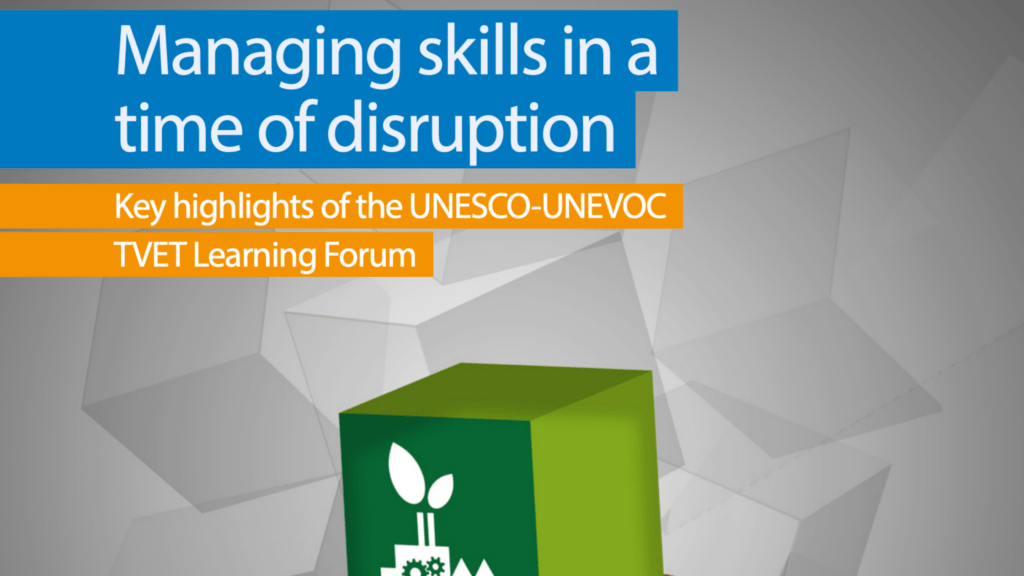The UNESCO-UNEVOC TVET Learning Forum, held on 24-25 May 2018 in Bonn, Germany, brought together over 100 participants from various technical and vocational education and training (TVET) community sectors. The forum, organised with the support of the German Federal Ministry of Education and Research (BMBF) and the Federal Ministry for Economic Cooperation and Development (BMZ), focused on the theme of “Managing Skills in a Time of Disruption”. This article summarises the key discussions and outcomes of the event.
Context and Challenges
The forum was built on the insights from the 2017 international conference in Tangshan, where UNESCO highlighted the factors shaping the future TVET landscape. These include sustainable development, demographic shifts, economic trends, labour market changes, and migration patterns. The 2030 Sustainable Development Agenda is a significant driver of change, influencing how development is pursued globally. Digital technology, including Industry 4.0, smart production, and big data, profoundly impacts the world of work, altering job profiles and skill demands. Additionally, migration and demographic changes require TVET systems to adapt to local and global skills landscapes, while climate change demands a transition towards green and sustainable economies.
Key Areas of Disruption
- Digital Disruption:
- Digital technology is transforming the world of work, creating new professions and eliminating others.
- TVET systems must prepare learners for a digital future by updating programmes, organisational structures, and delivery modes.
- Questions arise regarding the support needed for building institutional and teacher capacities and sourcing necessary resources.
- Climatic Disruption:
- The transition to a green economy is essential for achieving the Sustainable Development Goals (SDGs).
- TVET systems must raise awareness, improve education, and build capacities to prepare the workforce for green jobs.
- Institutions must address skills mitigation and adaptation and invest in the required resources.
- Migration and Demographic Shifts:
- Migration and demographic changes reshape the labour market, requiring the integration of local and migrant skills.
- Effective skills assessment and recognition methods are essential for harnessing the potential of migrating populations.
- Institutions must enhance labour market intelligence, cooperate with local enterprises, and improve inclusiveness and equity in skills development programmes.
Forum Discussions and Outcomes
The forum featured plenary sessions, panel discussions, and strategy labs. Key reflections from the event include:
- Understanding Disruptions:
- A comprehensive understanding of global and local developments is necessary to contextualise the impacts on TVET and skill development.
- Cooperation and Lifelong Learning:
- Skills development should not be isolated; inter-sectoral cooperation and lifelong learning are essential for adapting to disruptions.
- Empowering Teachers and Trainers:
- Teachers and trainers need new pedagogical approaches, motivation, and capacity to utilise technological advancements.
- Broad Stakeholder Engagement:
- Effective policy-making requires the involvement of various stakeholders, including ministries, international organisations, the private sector, and youth.
Main Conclusions from Strategy Labs
- Diversifying Financing and Investment:
- Demonstrating the economic and social return on investment in TVET is required to engage different actors and resources.
- Skills for Migrant and Displaced Populations:
- A flexible TVET system and multi-level stakeholder involvement are needed to address the skills and integration of migrant populations.
- TVET for Green Jobs:
- Greening TVET should be integral to curricula, involving motivated teachers and local community actors.
- Preparing TVET Teachers for Digitalisation:
- Policies and local actions must support capacity-building for teachers to prepare for the digital future of work.
- Pathways between TVET and Higher Education:
- Promoting lifelong learning and reducing barriers to further education are essential for reflecting the changing nature of work.
- Entrepreneurial Learning in TVET:
- Entrepreneurial education helps adapt to disruptions, promoting experiential learning and developing entrepreneurial mindsets.
The Way Forward
The forum concluded with a call to action for the international TVET community and the UNEVOC Network to:
- Develop leaders capable of driving innovation and change.
- Generate and share knowledge to bridge experiences globally.
- Strengthen collaboration to disseminate best practices and encourage peer learning.
Under its Medium-Term Strategy for 2018-2020, UNESCO-UNEVOC aims to address TVET leaders’ capacity needs, enhance knowledge exchange, and promote collaboration. By embracing global challenges at the institutional level and developing partnerships, the transformation of TVET systems worldwide can be realised.
For further details and access to the full report, visit the UNESCO-UNEVOC Learning Forum website.



